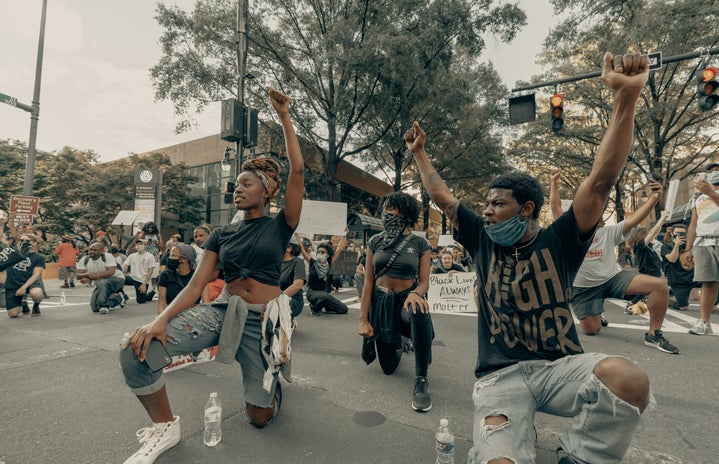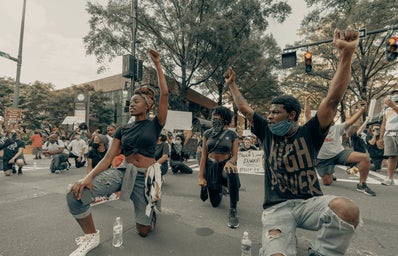February is Black History Month, a time to honor the contributions, work, stories and sacrifices of Black people in America. Black history is American history, and this month is a good time to remember how integral and engrained Black history and contributions are in our society, culture and nation.
- Remember the Hidden Figures
-
Admire King. Admire Angelou. But, learn about Claudette Colvin. Learn about Annie Lee Cooper. Understand the depth of importance of the Tuskegee Airmen. Google Fannie Lou Hammer.
There are many influential Black Americans and parts of Black history that the American school curriculum skips or glosses over. Don’t accept the whitewashed curriculum you learned in school, and don’t allow it to give you such a narrow view of Black leaders in history. Learn. Remember their names. Use the vast array of online resources that are at your fingertips to dive deeper into history.
You can watch films, read books or simply use your phone to become more educated about Black figures and widely untold stories. Below are some recommendations to further your knowledge of influential people in Black History.
- The “Red Tail Angels” is three-part documentary series about the story and contributions of The Tuskegee Airmen, the first Black military aviators, that was recently released from the Air Force Television at the Pentagon.
- “Hidden Figures” (2016) is all about the African American women mathematicians, Katherine Johnson, Dorothy Vaughn and Mary Jackson, who contributed greatly at NASA during the Space Race.
- Oprah Daily released an article last January with a long list of Black Americans that everyone should know.
- Stop the Performative Activism
-
Speak up, yes, but remember the difference between performative activism and true activism.
Controversial as it may seem, those “Blackout Tuesdays” black square posts that were all over social media in 2020 are a great example of how people use social media to prove one’s goodness and reputation, rather than truly standing in solidarity with the Black community. While intentions with these posts were very well, what good was it to see posts with #BLM or #BlackoutTuesday in the caption and your feed flooded with black squares rather than posts that shared information, or people partaking in activism, educational information and resources to donate, help or learn about the Black Community?
Being an activist for the Black community means not engaging in this weird half-sense of support. Social media gives a voice to underrepresented groups and it’s important to use social media’s range to reach out to different audiences in the world to bring eyes and change to a movement. But, just because you re-share an “anti-racist” post or engage with an Instagram tag saying “post if your support #BLM,” it does not always mean you are taking meaningful action.
How many people wanted to portray themselves in a positive light to show that they were “taking a stance?” How many people deleted their Blackout post a few weeks or so after they thought it would “die down?”
Let’s be clear, police brutality, racism and injustices against the Black community have never “died down.”
If you posted a Blackout square but won’t call out your racist aunt on her ideologies, ask yourself how much you truly care and how much of it is for show.
The Black community does not need performative allyship, it needs supporters.
The horrendous video, over 9 minutes long, showing George Floyd being murdered by Derek Chauvin sparked a national outcry. It sparked change; and that woman who picked her phone and recorded it helped carry a message, because history shows that no one would’ve believed any other narrative beside the police’s, and Darnella Frazier knew it. That is activism.
Using your voice can also mean spreading infographics, links to articles that educate or social justice content. These are more educational and serve a better purpose when made and shared with care and attention to facts and details.
On the flip side, you don’t always need to post to show that you support a cause, even with regards to the Black Lives Matter Movement. Triggering change that comes by a catalyst of protests, calls to congressmen and true activism does not have to be posted on a social media platform.
When you are able to check your privilege, lift up your Black figures and neighbors, celebrate diversity, move away from internalized hate and align yourself with love and acceptance, you are still bringing about change.
- Support Black-Owned Restaurants and Businesses
-
Coronavirus disproportionately impacted small, Black-owned businesses, who were facing challenges even before the pandemic came. During Black History Month and outside of February, protect the livelihoods of Black-owned business and restaurants and find a local place to support.
Social media has lots of restaurants and business owners that use platforms like Twitter and Instagram to share their work. They’re just waiting for you to find them. Use tags like #BlackOwnedRestaurants and #BlackOwnedBusiness to find a local place.
There are also various online resources including Support Black Owned and Official Black Wall Street that can you help you as well.


